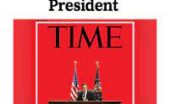Johannah Bernstein post: "eternally proud of my father’s extraordinary aeronautical engineering. legacy. here is a photo of the Canadair Water…
Wednesday Night #777 Avro Arrow
Written by Diana Thebaud Nicholson // January 22, 1997 // Herb Bercovitz, Reports, Ron Meisels, Special Wednesday Nights // 1 Comment
Photo credit: John Major/Postmedia News Files
The Arrow’s debut to the world as it was pulled out of the hanger to be viewed by Avro employees and invited guests.
Videotapes of the U.S. Presidential Inauguration launched a brief discussion of that event.
The guests, mostly experts in international aviation and international finance, then addressed the topics of the evening starting with the CBC version of the history of the Avro Arrow, The Avro Arrow: Canada’s Broken Dream, and the devastating effect on the Diefenbaker government of the cancellation of the project.
Prime Minister John Diefenbaker is portrayed as having caved in to American demands that the Arrow be scrapped and all existing plans, tapes, archives and models destroyed. This was not the case.
Associate Minister of Defence, Pierre Sévigny, who was present throughout the decision process leading up to the cancellation, stated that it was most likely that Crawford Gordon, head of the Arrow’s manufacturer, A.V. Roe, who had ordered the destruction in his anger.
He went on to describe in detail the facts and situation leading up to the cancellation.
We were reminded that the manufacturer was not Canadian but British owned.
A considerable amount of money had been spent on the project by the Canadian government, without prospect of success in a foreseeable period of time. Although the Iroquois engine was being built, the plane had not yet flown with it and it was therefore unproved.
The Arrow was incredibly costly and most of the Canadian Defense budget was being devoted to an aircraft whose performance was limited by its range (92 minutes in the air) and whose value for defense purposes was questionable.
The Arrow was designed to counter threats of bomber attacks. The Russians had already perfected the intercontinental ballistic missiles (ICBMs) with a range of 1,600 miles which would give rise to the Cuban Missile Crisis. The only defense system, although not a great one, was the Bomarc. The Bomarc missile had a range of 400 miles.
The project would only be viable if the Arrow were to be sold to NATO, an impossibility.
The then Minister of External Affairs was dead against bringing nuclear weapons into Canada. The Arrow would carry nuclear armament. More pertinent, the Liberal Government would probably have canceled the project, had the Grits been reelected, as there was increasing resentment of the dedication of so much funding to this project to the detriment of the other branches of the Armed Forces. (This was before unification of the Canadian forces and Paul Hellyer)
The Diefenbaker government knew that canceling the project would not lead to large aircraft manufacturing job losses because the plants could be used to manufacture cargo planes which at the time, were in increasing demand. In fact, the cancellation of the Arrow probably led to Canada’s current strength in the design and production of civil aircraft.
All agreed that the CBC programme was great theatre, but should not be the basis for a history course.
_____________
Cuban incident
A brief discussion followed on the shooting down of two unarmed American planes by Cuban armed forces over international waters. It was concluded that Cuba’s act was illegal, but that the United States had been guilty of “misusing” Civil Aviation.
Whither Air Canada (TCA)?
It was suggested that perhaps Canada should abandon the idea of a national airline. It was pointed out that while some developed nations choose to maintain national airlines for reasons of national pride or security rather than for economic health, the greatest problem is with less developed countries who can ill afford a national airline – in some cases consisting in one or two planes! – but do not want to be dependent on the United States or former colonial powers for air service. Some countries compromise safety to achieve this independence.
Distance education
Although difficulties of time and space are being overcome by the new technology, the classroom is not about to disappear because some things will always require face-to-face learning. The claim that better search engines were required was disputed, although it was agreed that self-education on searching strategies was needed. Likely, said some, the organization of search engines would be done more efficiently by professional librarians.
Harriet Solloway reports by E-Mail that her work with the International Crimes Tribunal for Rwanda has reached the stage of prosecutions. She is well, but the recent murders of aid workers have raised major security concerns.
The Market
Consensus that the Canadian economy will surge ahead in the next few years, with a lower rate of inflation than the United States and increasing productivity
It was suggested that the Canadian dollar should rise to par with the American, and perhaps even higher. There is a good possibility of a common currency in the foreseeable future.
The market should continue to rise until May or June followed by a correction followed by about nine months of uncertainty. After that period, the market should continue its upward trend. The prediction off “10,000 by 2000” is still valid in Ron Meisel’s opinion.





One Comment on "Wednesday Night #777 Avro Arrow"